- Home
- James Axler
Deathlands 068: Shaking Earth Page 9
Deathlands 068: Shaking Earth Read online
Page 9
“We were not targeted directly because we lacked all significance in the geopolitical sense. To be sure, we had the greatest population of any city in the world. But what of that? We were a neutral country, and while in practical terms we were friendly with los Estados Unidos, that fact was of no military consequence. We had no nuclear weapons of our own, nor any force-projection capabilities, as the ability to attack others in different parts of the world was then called. We had barely an army, and that was often strained to keep the peace in our own often unruly states.
“Now I take you for científicos—educated folk. I am sure you know, at least in broad outline, the history of the war itself. Our doom was caused by the earthshaker nukes the Soviets planted along the eastern arc of the Pacific Rim, the so-called Ring of Fire. The fearful vibrations they created, that sank so much of your western seaboard, struck terrible harmonics in the ground beneath our feet.”
As if to emphasize his words a tremor shimmied up through the travelers’ feet, rattling their bones ever so slightly as it made the dinnerware shift and clink on the table.
“This has always been a region of extraordinary seismic activity. Not for nothing have those who dwelled in the Valley of Mexico long called themselves the Sons of Shaking Earth. Destructive, deadly earthquakes were nothing new. Indeed, many of our newer and most imposing structures were built specifically to withstand great earthquakes.”
He gestured around with his fork. His headquarters lay near the southern edge of the city, affording a nearly unobstructed view of the lake. Lights shone from the windows of a few buildings looming nearby, candles and torches and lanterns, dim ghosts of the electric starlight that had once illuminated the city’s heart. The other skyscrapers were present merely as monolithic shadows, perceptible principally where they blotted out the real stars.
“Which is the only reason as many survived as did. Most did not, even of the mightiest structures. There are limits to how strongly we can make a thing, and no matter how powerful our creativity, it seems our ability to destroy is always stronger.”
“Ain’t that the truth,” J.B. said.
“The people, it is said, were dancing in the streets to the sound of cathedral bells, rung to celebrate our deliverance from the bombing, when the first great tremor hit. Tens of thousands died in the space of a few minutes as giant buildings were thrown down on their very heads.”
“And let me guess,” Mildred said with a fork half raised to her full lips. “They turned out to be the lucky ones.”
“You are very wise. For while they died screaming, they died almost upon the instant. Not so the ones slain next, when the great volcanoes exploded. Just as no quake in our recorded history compared to those that struck, wave after horrible wave, on that terrible day, neither did any volcanic eruption compare to what happened then. Popocatépetl and Iztaccíhuatl each lost over a thousand feet of height in one huge belch. Huge clouds of superheated gas and incandescent ash rolled out in tides of death across the valley. They didn’t reach so far as the heart of the capital itself, although the suburbs were stricken, like Pompeii of legendary times. But the great city was not spared a blizzard of gray ash, falling to a depth to cover cars parked or wrecked in the streets, higher than the tallest man’s head. Those who had been outside or had been driven forth by the collapse of the buildings they had occupied drowned in a sea of choking, stinging ash.
“The shocks, the eruptions, the rains of ash continued—not for days or weeks but for years, all throughout the skydark and beyond. Yet in the end they proved not the worst of our tribulations. Oh, no.” He shook his head in sorrow.
“If I might venture a guess,” Doc said, gesticulating with his fork, “a couple of the Four Horsemen had yet to visit you.”
“Precisely so, Doctor. Although in truth our people, such as survived the shaking and the suffocating clouds, were mostly spared the lingering death of Famine.”
He drank from his goblet. “Only because Pestilence struck them down before they could starve. Undoubtedly you know, from your own history if not your own experiences, how tenacious human life is. Even the greatest and most comprehensive disaster will generally leave survivors in its wake. And however wretched or reduced they are, they proceed with their lives, create a daily routine that is tolerable to them. Such, literally, is life. But the plagues that followed the tremors and eruptions were so vicious and swift that they literally cleansed the rubble of survivors. Most of our current scholars believe that within two months no humans remained alive in what had been the largest collection of humanity in our history. In fact, they now debate whether the plagues were altogether natural, or whether they were some kind of biological-warfare organisms, unleashed upon us incidentally, as what was called in those days ‘collateral damage,’ or whether some force hostile to us, perhaps domestic terrorists, struck at us in our time of greatest vulnerability. However it happened, our mighty city was destroyed and purged of life. And so it remained for most of a century.”
He seemed an unlikely sort for a baron, their host, this Don Tenorio. He was a small, dark man, clearly on the downward slope of middle age, spare, graying, in fact perhaps a bit gray overall. His features were spare, his mouth a slit, his nose a great beak, in general betraying more than slight relationship to the human Chichimecs the companions had encountered. He seemed not just to lack but to be the antithesis to the sort of flamboyance, the larger-than-life swagger that characterized the Deathlands barons they had encountered, the good, at least comparatively, as well as the bad. He seemed more suited to be a clerk, a shopkeeper, a bureaucratic mouse not big or imposing enough even to be a rat.
But as they sat at his table and ate his food and drank his wine, both copious and fine, Ryan began to perceive him in a different light. Nor was it simply the light of candles Don Tenorio used to light his dining hall, a trick, Ryan gathered, like the heavy wooden furniture and blankets patterned in muted but multiple colors hung from the walls, to transform the sterile chamber in a reclaimed skyscraper, smelling inescapably of moisture and mildew and in the occupants’ subconscious if not actual fact, of ancient death, into something approximating a hall in some fine adobe villa built on dry and solid ground.
As he spoke, the alcade’s skin seemed to take on an almost transparent quality, and his eyes to burn, as though they were thin membrane and dark lenses showing forth the light of the spirit and vision that burned inside.
Jak was frowning. He nodded out the window. “Why much water?”
“An excellent question. Mexico City was built upon a lake. Its predecessor, Tenochtitlán of the fierce and terrible Aztecs, itself lay in the midst of Lake Texcoco. In time Texcoco was virtually covered over, paved over, by Mexico City, as were several other substantial lakes nearby.
“With the continuing powerful quakes, the waters rose, or the land sank, or perhaps both. Indeed, so it happened throughout this great catchment basin that we by tradition miscall a valley, which in fact has no outlets for water, so that no rivers flow out of it. Heights were cast down, others thrust up. The normal work of millions of years of geological formation occurred in short years, in some cases weeks. We believe it was the single most violent seismic upheaval, not in written history, but in the whole year history of the human species. The whole land was transformed, so that when the people emerged from caves and shelters after the skies cleared and the nuclear winter ended, it was as if we had been transported to another realm.
“As I have indicated, not all the consequences of the disaster were bad. The valley, which had long been blessed with greater rainfall than the desert lands to the north, began to receive even more than before. And for the most part our rains were pure, not the acid rains and chem storms that have so ravaged your own homeland and indeed much of the northern reaches of our country. This weather pattern has persisted. We receive abundant water for irrigation. In the days of the Aztec, the waters of Lake Texcoco were brackish with salts carried down from the mountains. Nowadays the waters
of the lake, which we also call Texcoco, are fresh, fit for irrigation or, suitably sterilized, for human consumption.
“Even the volcanic ashfalls are a blessing as well as a curse. They create rich growing soils, causing the very lands they smother to spring back more fruitful than before. So our valley has been a relative haven in our tormented world. While the tremors and eruptions continue to take a toll, they have also helped to isolate us from a hostile outside world.”
“Yet you seem to be seeking contact with that world,” Ryan said. “Welcoming us for instance, not to put too fine an edge on it.”
“I believe the benefits inherent in peaceful trade outweigh the risks from such contact,” Don Tenorio said. “As you have observed, and as I have hinted at, we are not without means of defending ourselves.”
“And cooperation with Don Hector has been part of those means of self-defense?” Ryan asked.
Tenorio raised a thin gray eyebrow. “Most perceptive, Señor Cawdor. We reentered the long-dead City in the Lake a generation ago. At the time that was all the safety we required. Most residents of the valley believed the ruins were cursed, that it was death so much as to set foot among them, which was why the wealth present here remained totally untouched for the better part of a century. For years it was true enough, what with the plagues. But eventually the spores or whatever carried the contagion died out and lost their potency. Or perhaps the only humans to survive to our time were genetically immune to the plagues.”
“If I might be so bold as to make an inquiry, Don Tenorio,” Doc said, “how does it happen that you and certain other folk we have encountered speak English, much less so fluent and excellent a form as you yourself display?”
“Ah, but you flatter me, Doctor. As you may be aware, for a long time we Mexicans had a love-hate relationship with our neighbors to the north. Yet by your day, right before the war, English had indisputably become the international language. So learning that language had become institutionalized here. It continued to be taught even through the Great Skydark. Its knowledge has come to be associated with greater education, and hence with greater status—with class, if you like. Which is why Don Hector, who is in many ways a virulent traditionalist, encourages his elite, his priests and Eagle Knights, to learn it—to differentiate them from the commoners.”
He patted his lips with his napkin. “Ah, but it grows late, and doubtless you are fatigued from your ordeal. I will not torment you with further questions. I hope you rest well, though, for there remains a world of things I wish to ask you of.”
“I SHALL SEE YOU gentlemen in the morning,” Doc said. “In the meantime, I am off to the chambers our host has graciously provided, there to renew my long-standing acquaintance with Mr. Jack Daniel’s.” The tall, gaunt man hoisted his salvaged bottle to his companions.
“’Night, Doc,” J.B. said. “Sweet dreams.”
Doc showed him a rare, sad smile. “Ah, John Barrymore, but for one such as myself, the sweetest dreams are no dreams at all.” He went into the building, leaving his companions leaning on the terrace rail and shaking their heads.
“Where’s Jak?” Ryan asked.
His friend grinned at him. “Some sweet little señorita snagged him, is my guess. They seem to think he’s what they call muy bonito. Red eyes and all.”
He took a swig from his own bottle. “Ah, youth. It’s wasted on the young. Me, I gotta admit I’m glad Millie’s even more tired than I am. It’s about all I’m gonna be able to do to totter all the way to my bed before I pass out. I’m beat.”
The terrace they stood on had once been a restaurant overlooking the street from several stories up. The slowly heaving night-black water now came almost to their feet. It was a peaceful night, quiet but for the sporadic cries of some unknown night bird—or night something—and the distant grumble of the volcanoes, punctuated by explosions that sounded like a giant’s knuckles knocking on wood far away. The Armorer held up his bottle and admired the way the dark liquid within caught the starlight as he swirled on.
“Laphroaig single malt, as I live and breathe,” he said. “I tell you, Ryan, I’ll eat and drink damn near anything that I can get my hands on. But that doesn’t mean I don’t appreciate the best when I run across it.”
“Cow steak’s better than wolf steak, any day,” Ryan agreed, leaning on crossed arms. He had stopped his own drinking of anything but purified lake water early in the meal. He wanted to keep his head clear.
“You said a true thing there.”
“So what do you think of our host?”
“Don Tenorio? Seems a nice enough old codger. Mebbe too nice to be a baron.”
“Not too nice to ply us with alcohol on empty stomachs, I noticed.”
“Yeah. But that’s just boilerplate. Trader would have done it, too, just to feel out somebody he didn’t know and was none too sure of. What’s that line Doc’s always quoting? ‘In weenie warthog’ or something?”
“In vino veritas.”
“There you go.” He took a pull at his bottle. “I do wonder how Don Tenorio’s going to want to be paid for all this lavish hospitality.”
“We have novelty value, right now,” Ryan said. “He seems to have a curiosity. And since he’s had visitors from up north before, not all of them friendly, it’s of real value to him to get what news he can.”
“Yeah, right now. But pretty soon we’ll be old news. I got a feeling this baron has something more in mind.”
Ryan shook his head. It wasn’t a gesture of denial; it indicated he flat didn’t know. “Mebbe. All I can say is, he seems legitimately friendly enough right now. And we can all use the rest, not just Krysty.”
The moon was rising like a giant self-luminous bubble squeezing up from the lake. J.B. saluted it with his bottle. “And speaking of which, I believe I’ll take me to my room and let you get along to her.”
He started away, stopped, turned back. “Oh. Just remembered. I want to ask the Doc what all that business was about that Walker fella.”
“I already did,” Ryan said. “Back in Doc’s time, little before actually, he led a party down to a place in Central Merica, ways south of here. They aimed to take over.”
“How’d that turn out?”
“He went to the wall, eventually.”
“Figures.” The Armorer nodded sagely. “Another dude just had to be baron, and all it got him was the chop.”
THE WINDOW WAS OPEN in the dark infirmary. That surprised Ryan; in most of the big buildings in these old dead cities, you couldn’t open the windows. The breeze was fresh and cool and smelled of the water, and only a tiny tang of sulfur from the endless eruptions.
The moonlight came gushing in the window and splashed over Krysty where she lay asleep in the bed, among white sheets for one of the few times in her life. They did all right for themselves here, the baron and his colony of scavvies. Krysty looked pale even for her, her skin almost greenish in the moonlight. Still, her breathing was regular—her mouth was open and she snored gently—and her cheek, when he touched it with the back of his hand, gently, so as not to rouse her, seemed cooler to him.
Taking off his long coat, he shook it out and spread it on the linoleum floor beside her bed. He pulled his SIG-Sauer, pulled back the slide far enough to confirm it was loaded by the dull gleam of brass in the moonlight. Then he eased the slide shut again.
They were in the proverbial position in which, should the baron have wished them harm, he could have done it to them at any time. But it went against Ryan’s grain, and long years of hard lessons in the company of Trader, tough and survival-wise as an old gray rat, to take security for granted. A baron’s son himself—and exiled through the treachery of his own kin—he knew how fickle a baron’s mercy and hospitality might be. And while this baron seemed almost unnaturally easygoing, even benign, that didn’t exactly lull Ryan into complacency; was this Don Tenorio really hard-assed enough to take the measures necessary to protect himself, far less his current honored guests, from h
ostile outsiders, who didn’t seem in short supply in the valley? Or insiders for that matter—as yet the travelers had no real skinny on the internal politics of Don Tenorio’s sunken ville.
He would sleep well. But he’d keep his blaster near to hand. He used the decocker to ease the hammer down on the chambered round, ready to be cocked again at the squeeze of the trigger, slipped on the safety. He set the weapon on the floor beside Krysty’s bed.
He bent over her and kissed her forehead. Then he laid himself down on his coat and fell instantly asleep.
* * *
Chapter Twelve
“What do you use for fuel in this beast, Don Tenorio?” J. B. asked, shouting to make himself heard over the roar of the big boat’s motor. The gleaming white craft was raising a big bow wave of pale foam as it thrust itself across the surface of the lake.
“Alcohol,” the baron called back from where he stood on the flying deck atop the cabin behind and above them. “We have developed techniques to distill it from the algae and weeds that grow in the lake.”
J.B. nodded appreciatively. To his friends, gathered near him on the foredeck up toward the bow, he said, “Sometimes even whitecoats do some good, I guess. But if you catch me about to take a sip of any of their homebrew, do me a favor and shoot me right there.”
“Indeed,” Doc said. He had his coat off, his sleeves rolled up, his lank hair streaming in the breeze of their passage. His cheeks showed an unusual amount of color.
“Nautical life seems to agree with you, Doc,” the Armorer remarked. “Too bad Millie’s feeling a bit off. I reckon she’d enjoy this little junket.”
“With full respect, John Barrymore,” Doc said, “I suspect her plea of illness was but a ruse, and that her true desire was to spend the day abed reading volumes from our host’s extensive library.”

 End Program
End Program Nemesis
Nemesis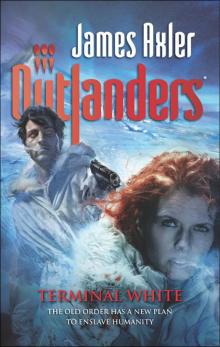 Terminal White
Terminal White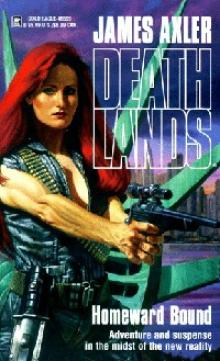 Homeward Bound d-5
Homeward Bound d-5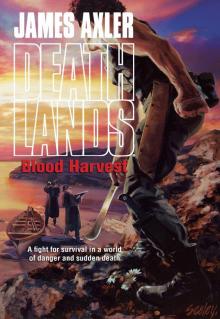 Blood Harvest (v5)
Blood Harvest (v5)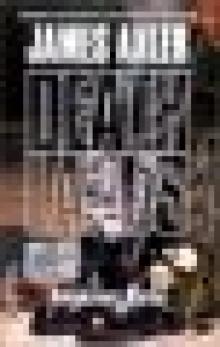 Amazon Gate
Amazon Gate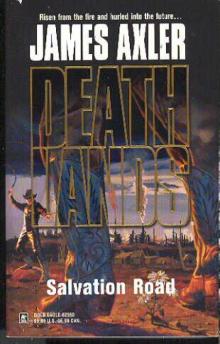 Salvation Road
Salvation Road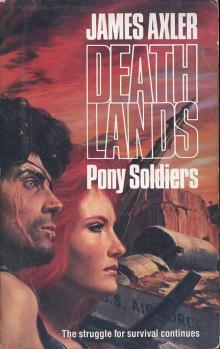 Pony Soldiers
Pony Soldiers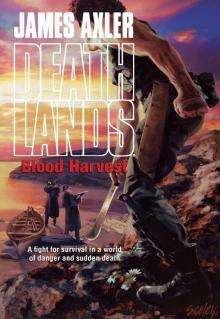 Blood Harvest
Blood Harvest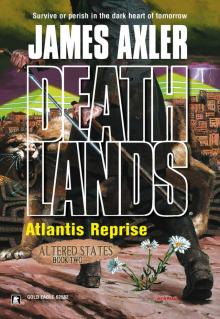 Atlantis Reprise
Atlantis Reprise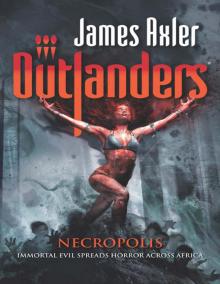 Necropolis
Necropolis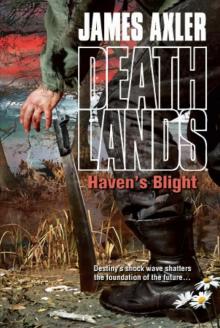 Haven's Blight
Haven's Blight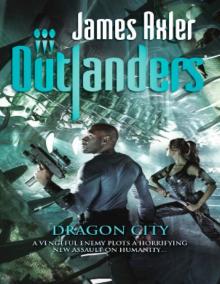 Dragon City
Dragon City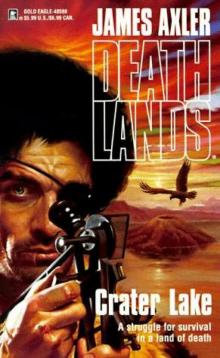 Crater Lake
Crater Lake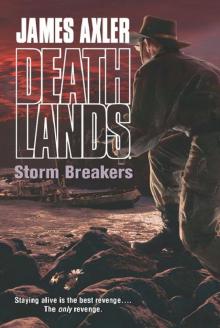 Storm Breakers
Storm Breakers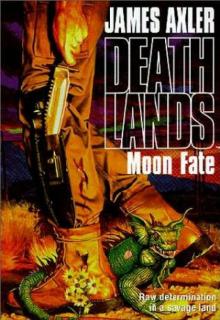 Moon Fate
Moon Fate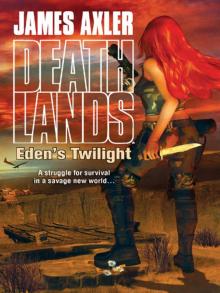 Eden’s Twilight
Eden’s Twilight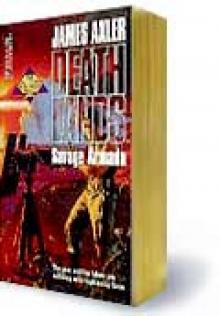 Savage Armada
Savage Armada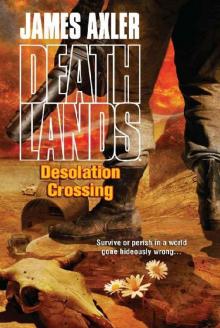 Desolation Crossing
Desolation Crossing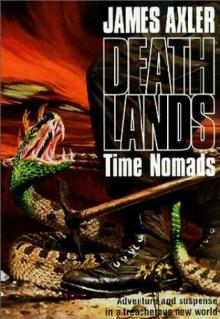 Time Nomads
Time Nomads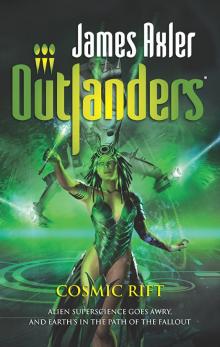 Cosmic Rift
Cosmic Rift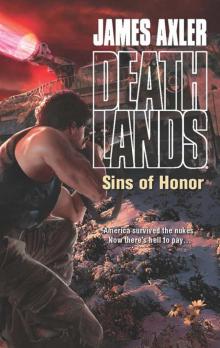 Sins of Honor
Sins of Honor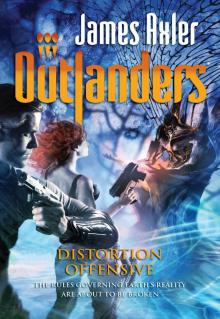 Distortion Offensive
Distortion Offensive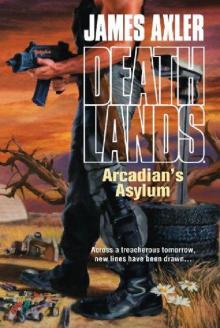 Arcadian's Asylum
Arcadian's Asylum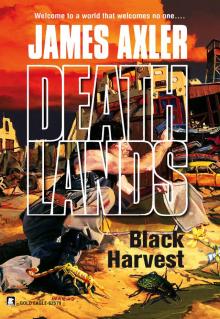 Black Harvest
Black Harvest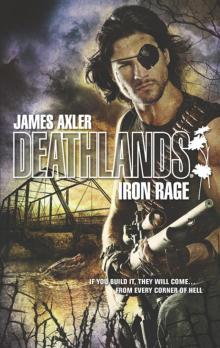 Iron Rage
Iron Rage Nightmare Passage
Nightmare Passage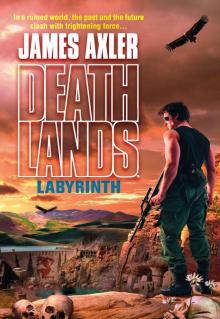 Labyrinth
Labyrinth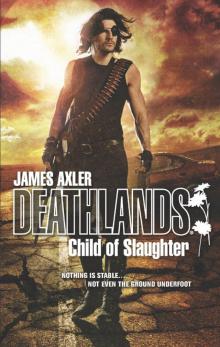 Child of Slaughter
Child of Slaughter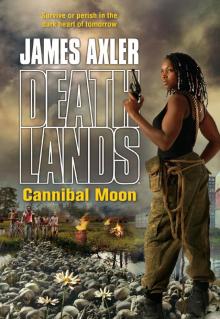 Cannibal Moon
Cannibal Moon Tainted Cascade
Tainted Cascade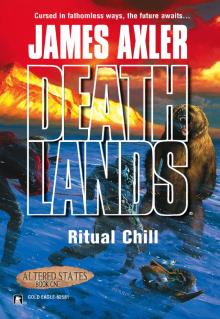 Ritual Chill
Ritual Chill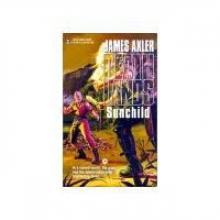 Sunchild
Sunchild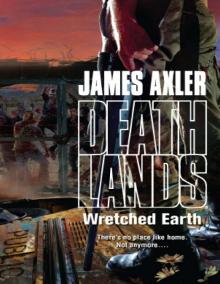 Wretched Earth
Wretched Earth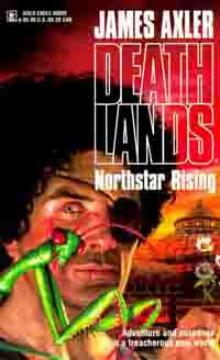 Northstar Rising d-10
Northstar Rising d-10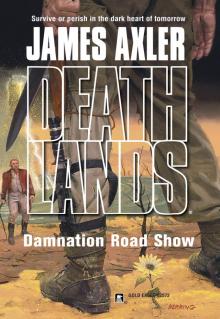 Damnation Road Show
Damnation Road Show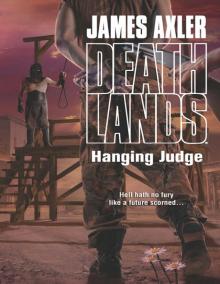 Hanging Judge
Hanging Judge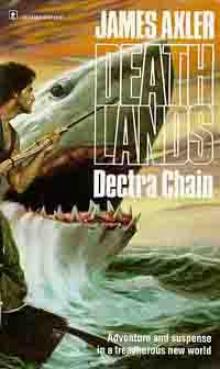 Dectra Chain d-7
Dectra Chain d-7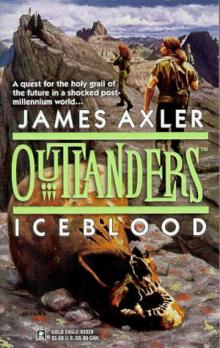 Iceblood
Iceblood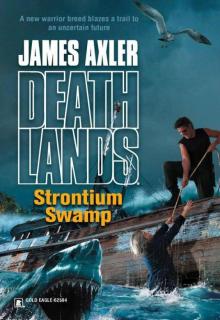 Deathlands 074: Strontium Swamp
Deathlands 074: Strontium Swamp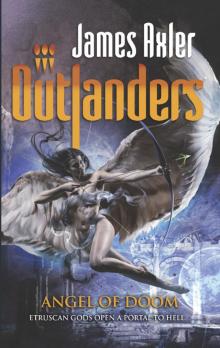 Angel of Doom
Angel of Doom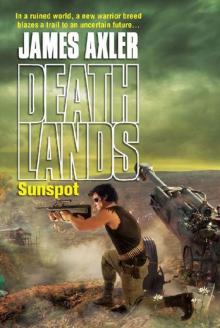 Sunspot
Sunspot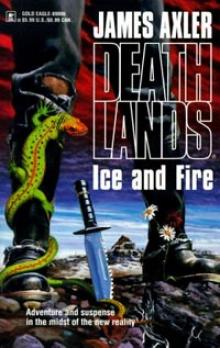 Ice and Fire d-8
Ice and Fire d-8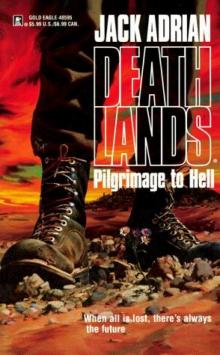 Pilgrimage to Hell d-1
Pilgrimage to Hell d-1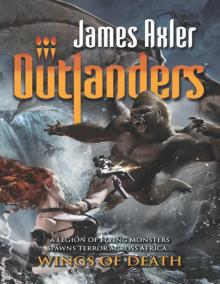 Wings of Death
Wings of Death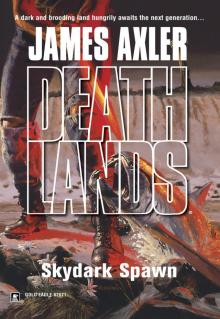 Skydark Spawn
Skydark Spawn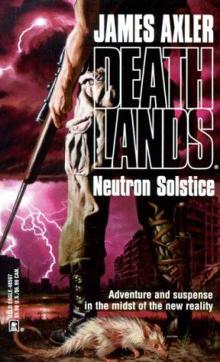 Neutron Solstice d-3
Neutron Solstice d-3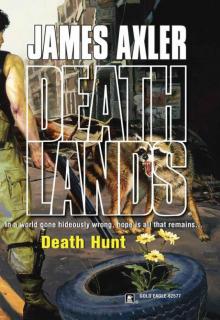 Deathlands 067: Death Hunt
Deathlands 067: Death Hunt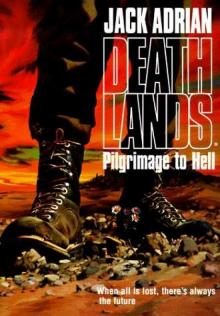 Pilgrimage to Hell
Pilgrimage to Hell Siren Song
Siren Song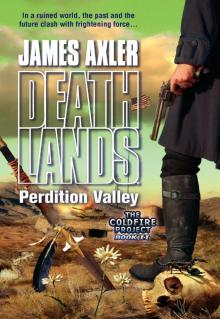 Perdition Valley
Perdition Valley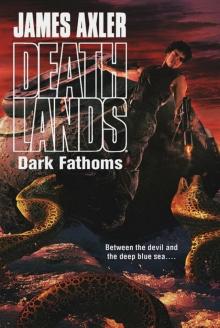 Dark Fathoms
Dark Fathoms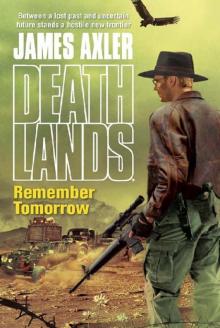 Remember Tomorrow
Remember Tomorrow Crucible of Time
Crucible of Time Savage Armada - Deathlands 53
Savage Armada - Deathlands 53 Judas Strike - Deathlands 54
Judas Strike - Deathlands 54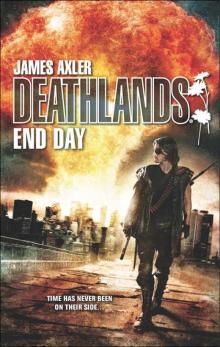 End Day
End Day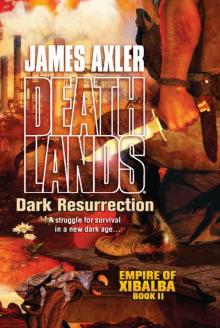 Dark Resurrection
Dark Resurrection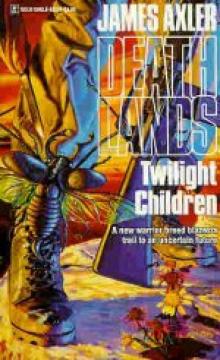 Deathlands - The Twilight Children
Deathlands - The Twilight Children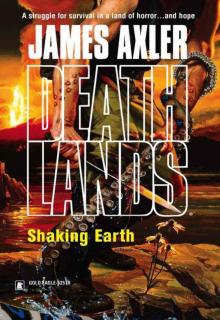 Deathlands 068: Shaking Earth
Deathlands 068: Shaking Earth Breakthrough
Breakthrough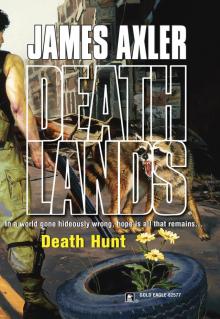 Death Hunt
Death Hunt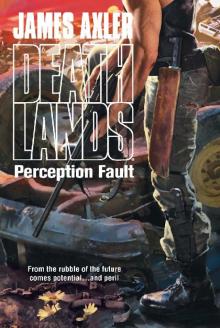 Perception Fault
Perception Fault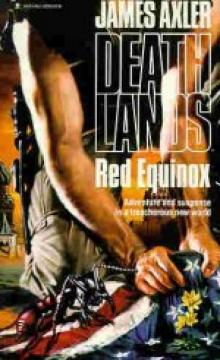 Red Equinox
Red Equinox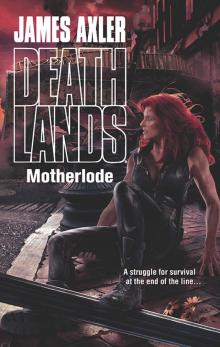 Motherlode
Motherlode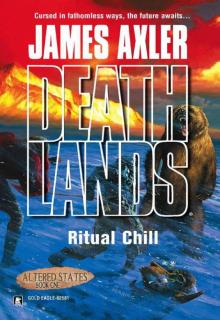 Deathlands 071: Ritual Chill
Deathlands 071: Ritual Chill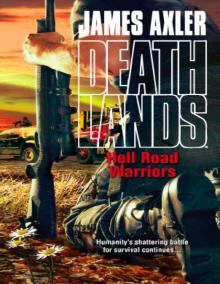 Hell Road Warriors
Hell Road Warriors Downrigger Drift
Downrigger Drift Gaia's Demise
Gaia's Demise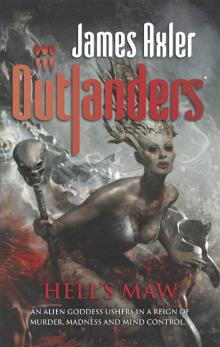 Hell's Maw
Hell's Maw Devil's Vortex
Devil's Vortex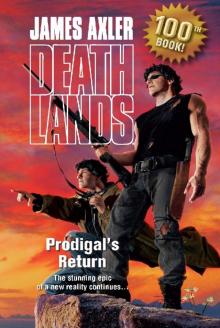 Prodigal's Return
Prodigal's Return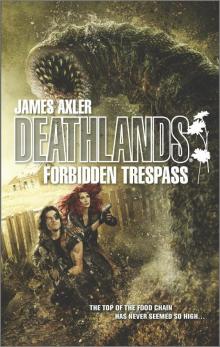 Deathlands 122: Forbidden Trespass
Deathlands 122: Forbidden Trespass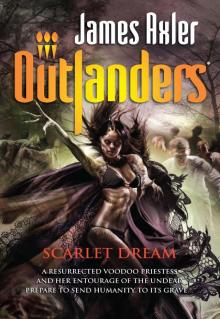 Scarlet Dream
Scarlet Dream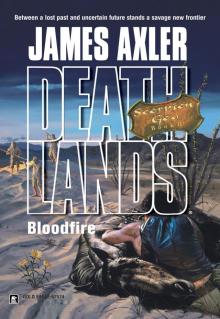 Bloodfire
Bloodfire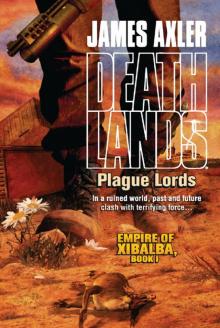 Plague Lords (Empire of Xibalba, #1)
Plague Lords (Empire of Xibalba, #1)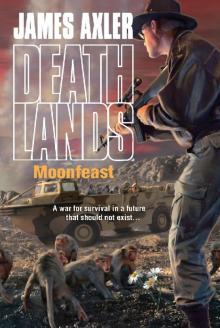 Moonfeast
Moonfeast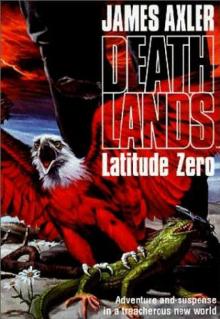 Latitude Zero
Latitude Zero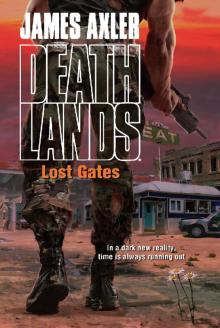 Lost Gates
Lost Gates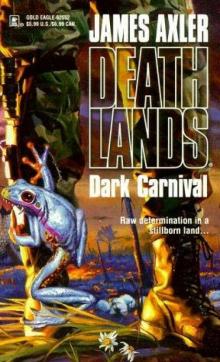 Dark Carnival
Dark Carnival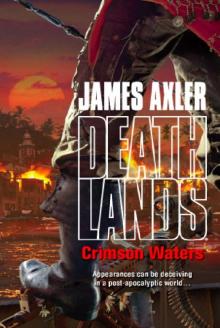 Crimson Waters
Crimson Waters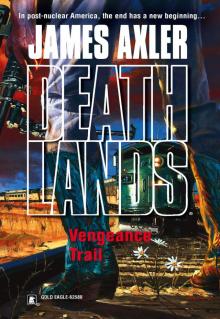 Vengeance Trail
Vengeance Trail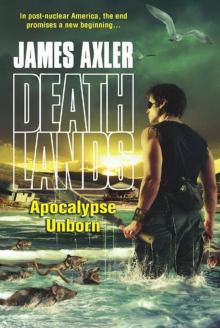 Apocalypse Unborn
Apocalypse Unborn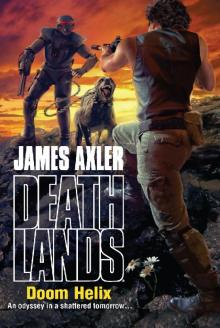 Doom Helix
Doom Helix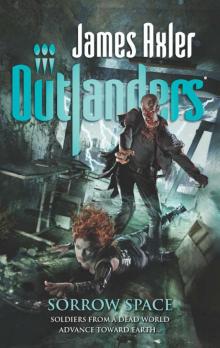 Sorrow Space
Sorrow Space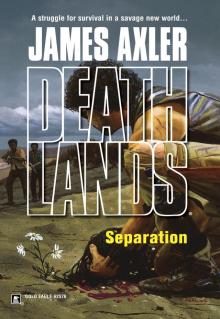 Separation
Separation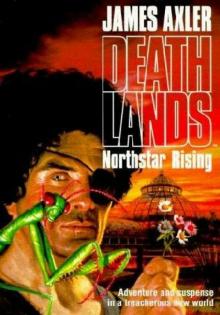 Northstar Rising
Northstar Rising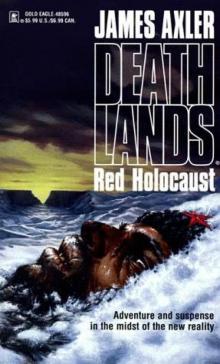 Red Holocaust
Red Holocaust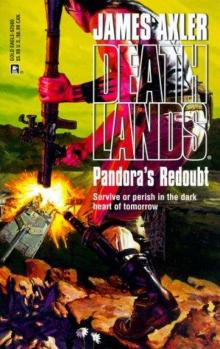 Pandora's Redoubt
Pandora's Redoubt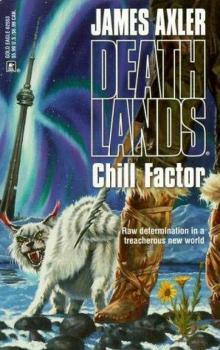 Chill Factor
Chill Factor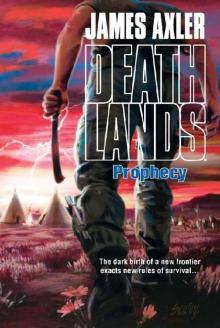 Prophecy
Prophecy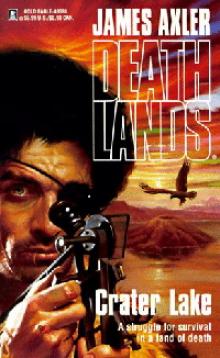 Crater Lake d-4
Crater Lake d-4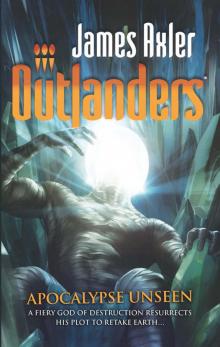 Apocalypse Unseen
Apocalypse Unseen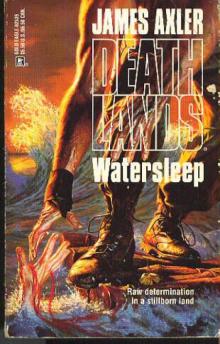 Watersleep
Watersleep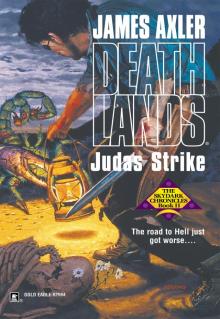 Judas Strike
Judas Strike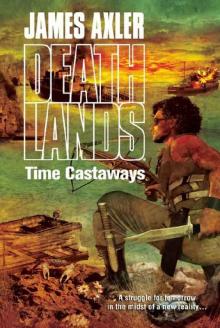 Time Castaways
Time Castaways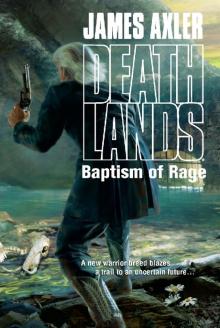 Baptism of Rage
Baptism of Rage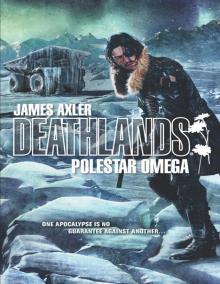 Polestar Omega
Polestar Omega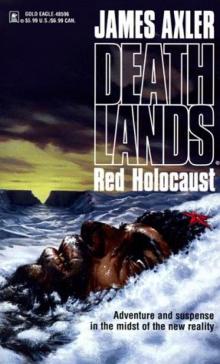 Red Holocaust d-2
Red Holocaust d-2 Outlanders 15 - Doom Dynasty
Outlanders 15 - Doom Dynasty Way of the Wolf
Way of the Wolf Deathlands 075: Shatter Zone
Deathlands 075: Shatter Zone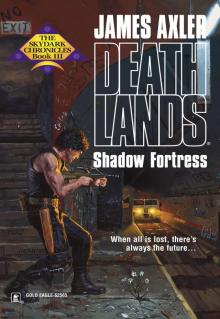 Shadow Fortress
Shadow Fortress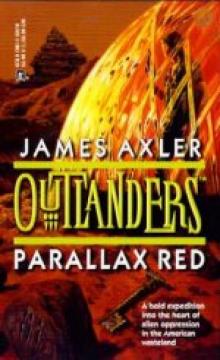 Outlander 05 - Parallax Red
Outlander 05 - Parallax Red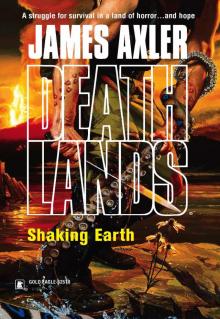 Shaking Earth
Shaking Earth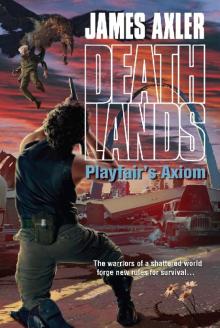 Playfair's Axiom
Playfair's Axiom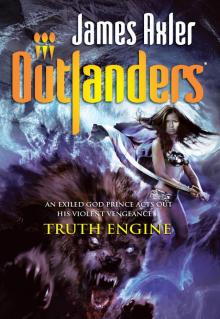 Truth Engine
Truth Engine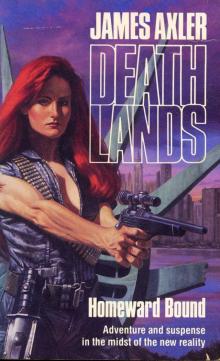 Homeward Bound
Homeward Bound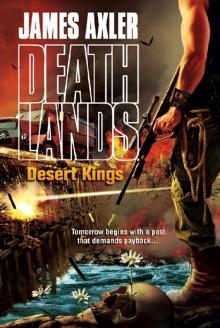 Desert Kings
Desert Kings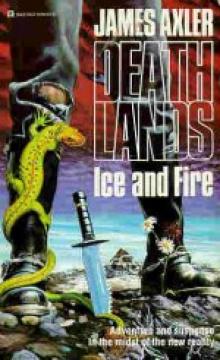 Ice and Fire
Ice and Fire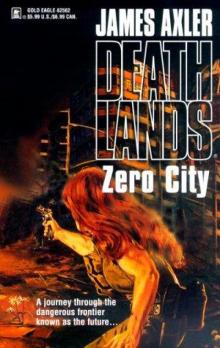 Zero City
Zero City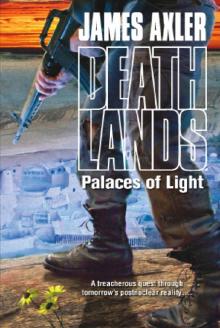 Palaces of Light
Palaces of Light No Man's Land
No Man's Land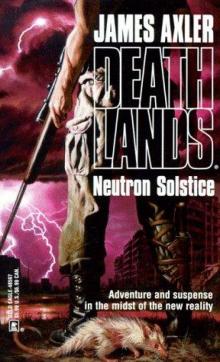 Neutron Solstice
Neutron Solstice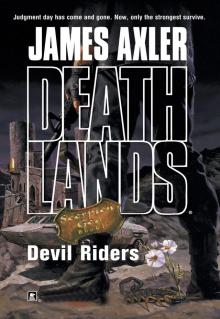 Devil Riders
Devil Riders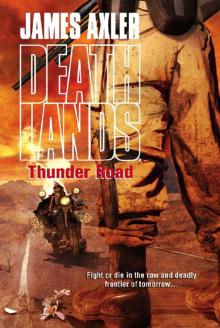 Thunder Road
Thunder Road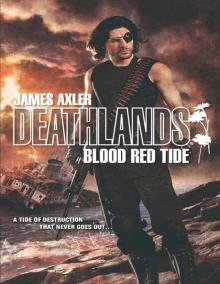 Deathlands 118: Blood Red Tide
Deathlands 118: Blood Red Tide Deathlands 114: Siren Song
Deathlands 114: Siren Song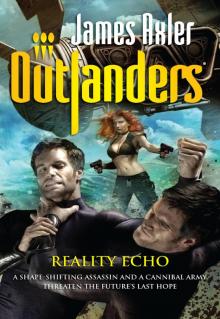 Reality Echo
Reality Echo Hive Invasion
Hive Invasion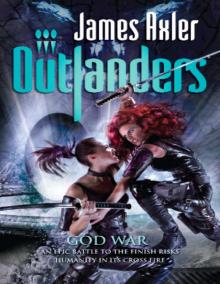 God War
God War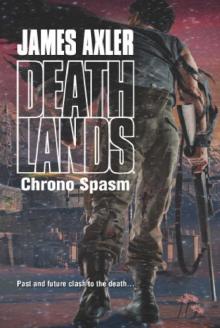 Chrono Spasm
Chrono Spasm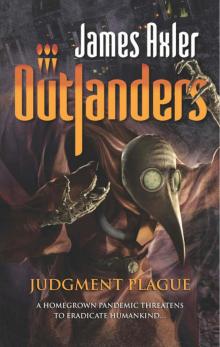 Judgment Plague
Judgment Plague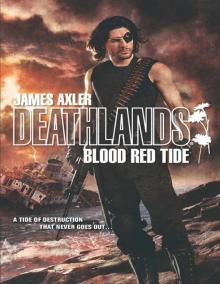 Blood Red Tide
Blood Red Tide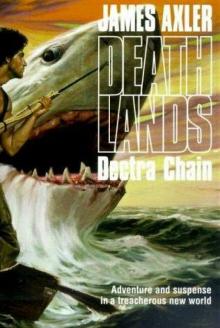 Dectra Chain
Dectra Chain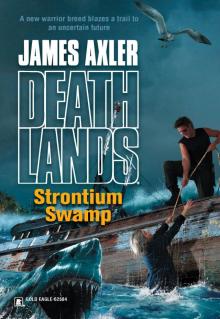 Strontium Swamp
Strontium Swamp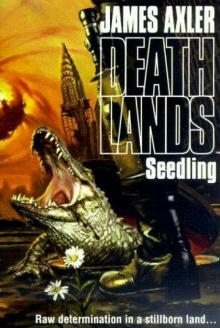 Seedling
Seedling Shatter Zone
Shatter Zone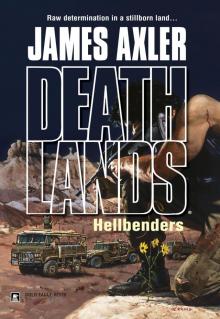 Hellbenders
Hellbenders